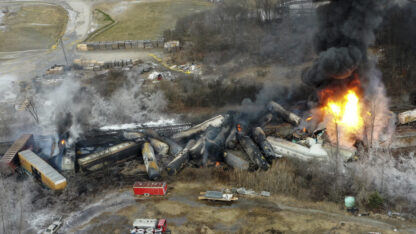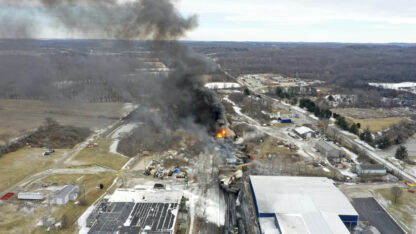This story was updated on Thursday, June 6.
A section of the Chattahoochee River in metro Atlanta remains closed after an issue at a Fulton County water treatment plant. Fulton officials are working to address the problem at the Big Creek Water Reclamation Facility. Though they say they’ve made progress getting the plant fully operational again, the county doesn’t yet have a firm date on when it will be fixed.
In the meantime, the facility is releasing about 15 million gallons a day of partially-treated wastewater into the river.
Chattahoochee Riverkeeper Jason Ulseth said his group first detected high E. coli levels in the river last Wednesday, June 28. Ulseth eventually found where it was coming from, bubbling up from under the water.
“What we’re dealing with is a pipe ten feet underneath the river,” he said. “You can see it as it’s flowing, the ten feet up, and it starts to go at the top with toilet paper and fragments in there, and just a punch in the face raw sewage.”
The Riverkeeper notified Fulton County. By last Saturday, July 1, the county had concluded the source was the Big Creek Water Reclamation Facility in Roswell, according to Fulton Public Works director David Clark.
The facility handles about 20 million gallons of sewage every day from north Fulton County.
According to the county, the problems were caused by an imbalance of good and bad microbes.
Fulton is now trucking in the good kind of microbes to get the plant working again. As of Thursday afternoon, the county had brought in 40 truckloads, and five of the plant’s seven biological basins were showing “positive signs of biological function and treatment,” according to Clark. That’s up from only one of the basins being in operation this past Monday.
Clark said it could take a couple of weeks to figure out what caused the plant’s processes to break down.
“We feel that something happened — either some sort of foreign substance, possibly a chemical, entered the plant that upset the bacteria,” he said.
It could have been chlorine from a large pool being drained, for instance, or some other chemical from an industrial process.
Clark said the county has a monitoring program where larger industrial facilities are required to test their water to make sure they’re not releasing anything that would upset the water treatment plant’s process. He said as they figure out what caused the biological breakdown, they’ll review which companies release the chemical cause.
“Not that we’re going to necessarily point the finger at anybody,” he said. “But we’re certainly going to spend the time to make sure that our inspection program is meeting its expectations.”
Still, Ulseth said he’s never seen a situation like this, where a plant wasn’t working properly, and the operator wasn’t aware and had to be notified by his nonprofit.
“I’ve never heard of something happening on this scale, with the plant operators not being aware,” he said. “Accidents, of course, happen. And we all know that that’s life. But this was something that was very major.”
Clark said the county tests the water coming out of the plant every morning, but it takes about a day to get results back from the lab. He said the test conducted on Wednesday, June 28 didn’t show any issues, which is why he believes the problem occurred later that day. And until the county got results from the Friday test on Saturday morning, it was still searching for a sewer pipe leak as a possible cause, as opposed to the treatment plant itself.
But Ulseth was frustrated.
“We’re still very shocked that this actually happened,” Ulseth said. “The timing was horrible coming on Fourth of July weekend.”
The Chattahoochee River National Recreation Area has closed a large portion of the river within its boundaries to recreation, due to health concerns, and Ulseth said water quality downstream of the plant is still at dangerous levels, though he hasn’t found any dead fish.
The City of Atlanta’s drinking water intake is downstream, but the city says it hasn’t been affected. Ulseth agreed that he’s not anticipating issues for Atlanta. Fulton County said its drinking water and that of other communities is not affected, either.
Fulton County is diverting about 5 million gallons a day of wastewater to a Cobb County facility. The rest of the sewage is still going through Big Creek, and only being partially treated before going into the river. The U.S. Army Corps of Engineers is releasing extra water from Lake Lanier to help clear out the mess.
Fulton is currently working on an expansion of the Big Creek facility. When it’s complete, the plant’s capacity will go up to 32 million gallons a day of sewage, up from the current 24 million gallons a day. Clark said the expansion will also modernize the water treatment at the plant, with more advanced filters added at the end of the process.
“If those were in place today, this event would have been a lot less impactful on the river,” he said.










